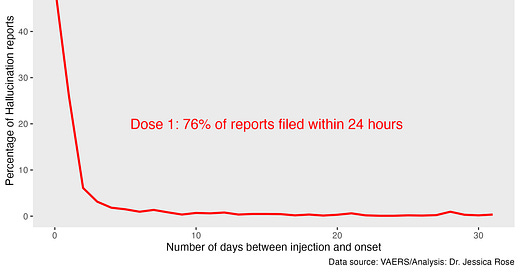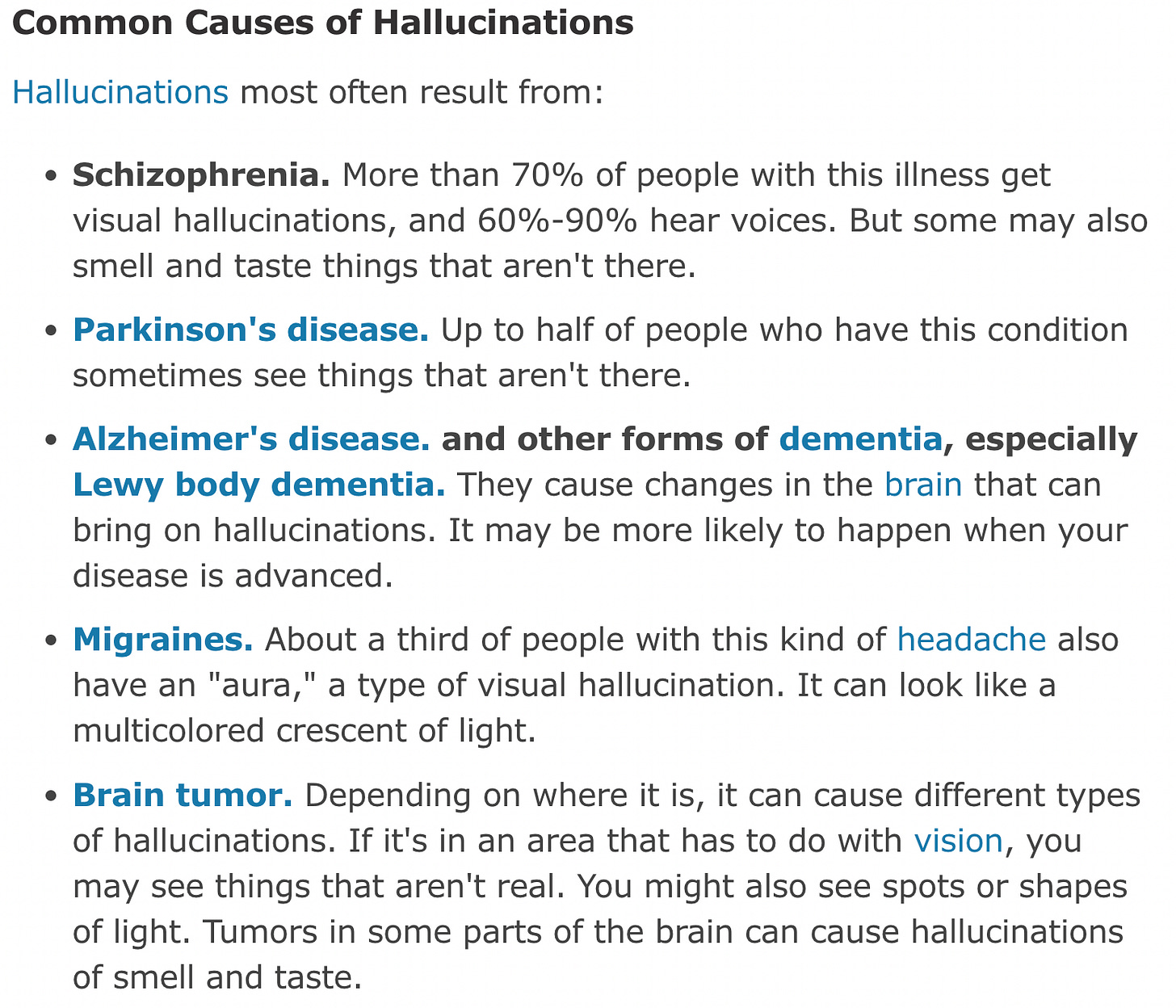Psyche symptoms (hallucinations) in VAERS associated with COVID injections
I must say, I am a little surprised by the numbers
I was prompted by three separate meetings/events to investigate psyche symptoms in VAERS. The SAVAERS meeting I attended yesterday to hear Clare Craig speak was very informative, and one of the doctors (Dr. Botha) mentioned at the end during the question and answer period that she has seen a sportsman as a patient recently. This sportsman had recently been detailed with suicide watchers, since he reportedly had begun to hear voices telling him to off himself, shortly after one of his injections. This shocked me.
I am fascinated with neuropsychology - absolutely fascinated. This sounded like acute onset schizophrenia to me. But is that even a thing? Schizophrenia is thought to be primarily inherited isn’t it? How would acute onset even occur? After Dr. Botha’s account, Clare herself said she heard exactly the same story from someone she knew! South Africa and the UK are pretty far away, aren’t they? What could be the commonality here?
I then got two more indications that I had to check out what the most recent VAERS data was revealing with regard to psyche symptoms. My query included the keywords: "psych", "schiz", "halluc", "delus", "visions", "voices", "suicid" and "mania", "dreams", "seiz", "conscious", "memory" and "depress". I wanted to start broad, hence why I included seizures and depression. Notice I left out "anxiety", mainly out of spite. (Muttering under my breath to the gaslighting doctors: It’s not anxiety, assholes.)
Guess how many reports the query returned? 54,905. I was not expecting that. No under-reporting factor. The data is distributed like this:
Something notable here is that there is a clustering around the younger folks (12-39). This is not usual, and I have only seen this in the context of syncope and specific cardiac malfunctions (myocarditis). So this indicates that reporting rates of psyche symptoms, seizures and depression are higher in young people.
I wanted to see how many of these reports were being specifically made in reference to hallucinations (auditory and visual) and suicide, to see just how common this extraordinarily uncommon ‘side effect’ was in VAERS.
The number of reports of hallucinations and suicide as separate queries are N = 2,995 and N = 924. Reports of depression as an adverse event are at a staggering N = 11,187. Notably, only 28% of these individuals had a reported history of depression.
Let’s dig one level deeper into those hallucinations: how many auditory and how many visual. How many people were on risperidone or other anti-psychotics like halperidol, loxapine or thorazine?
261 reports (~9%) involved auditory hallucinations and 415 (~14%) involved visual hallucinations. Of these subgroups, only 5 (1.9%) and 2 (0.5%) had reported histories of either auditory or visual hallucinations, so this indicates new onset. Only a single person was taking the anti-psychotic risperidone, so not a lot to talk about with regard to pre-conditions.
What would explain this? According to WebMD, the most common causes of hallucinations are the following:
Now, I make the case that this is not schizophrenia due to the fact that hallucinations are one symptom associated with schizophrenia but not necessarily a defining feature. So what induces hallucinations? Exogenous agents like LSD and Psilocybin can induce hallucinations but these are always transient. Well, unless you have constant exposure to them. Are the reported hallucinations experienced by these individuals transient? And how long after injection did the hallucinations begin?
The percentage of reports of hallucinations filed within 24 hours of injection is very high at 76%, when compared to other AEs such as suicide, whereby the percentage of reports filed within 24 hours is 53%. This is in-and-of-itself an interesting observation. It is also interesting to me that a little more than half (60%) of the reports were made following dose 1 with 72% of these reports made within 24 hours. That is odd to me. What is in these shots?
The duration of the hallucinations is a tough one to ascertain from the VAERS data, even with the SYMPTOM_TEXT free text information. If these hallucinations are transient, then I would be inclined to believe that something exogenous in the shots was inducing this effect. But, my intuition is telling me that these hallucinations are the result of some kind of neuro-degeneration induced by the shots, which could either be the result of spike protein being attacked and brain cells getting caught in the cross-fire (or directly), or prions. What I can’t explain yet is why there is such a high percentage of reports following dose 1, especially if this is neuro-degeneration? These ideas seem to conflict. Ideas and explanations more than welcome.
Here’s a list of WebMD’s prion disease symptoms:
Indeed, Creutzfeldt-Jacob disease is associated with visual, auditory and tactile hallucinations.12 Demyelinating diseases such as multiple sclerosis and neurodegenerative diseases such as Parkinson’s disease are also both associated with hallucinations and psychosis.345
I don’t really have a good answer yet to the question: What’s causing people to hallucinate very shortly after being injected with the COVID shots. But one thing is for sure, this is very concerning and I believe that these reports are just the tip of the iceberg.
I would love some feedback on this subject matter. Please, email me or tell me your stories in the comments.
Klotz, D.M., Penfold, R.S. Low mood, visual hallucinations, and falls – heralding the onset of rapidly progressive probable sporadic Creutzfeldt–Jakob disease in a 73-year old: a case report. J Med Case Reports 12, 128 (2018). https://doi.org/10.1186/s13256-018-1649-4.
Javed Q, Alam F, Krishna S, et al. An unusual case of sporadic Creutzfeldt-Jakob disease (CJD). Case Reports 2010;2010:bcr1220092576.
https://www.parkinson.org/understanding-parkinsons/non-movement-symptoms/hallucinations-delusions
Weil RS, Reeves S. Hallucinations in Parkinson's disease: new insights into mechanisms and treatments. Adv Clin Neurosci Rehabil. 2020 Jul 13;19(4):ONNS5189. doi: 10.47795/ONNS5189. PMID: 33102741; PMCID: PMC7116251.
Davis BE, Lakin L, Binns CC, Currie KM, Rensel MR. Patient and Provider Insights into the Impact of Multiple Sclerosis on Mental Health: A Narrative Review. Neurol Ther. 2021 Jun;10(1):99-119. doi: 10.1007/s40120-021-00240-9. Epub 2021 Apr 20. PMID: 33877584; PMCID: PMC8056993.








I was (mis) diagnosed as Bipolar in 2009 by an NHS psychiatrist and was prescribed Risperidone which i took regularly until 2021 when I read Peter Breggin's book: https://www.amazon.co.uk/COVID-19-Global-Predators-Are-Prey/dp/0982456069
I read at page 286/7 the truth about this drug and dropped it immediately. I reported my experience to Peter & Ginger on their blog last year. They actually saved my life. The truth is I had suffered a short-term trauma in 2008 ( an accident) and my symptoms were the results of the aftermath of shock - PTSD is the term - but it is very much recoverable - quite quickly.
I have made even more progress over the years and have a rewarding occupation as a writer and researcher on Substack. I am 78 but will never retire - this is not work - it is a rewarding love of spreading the truth and I have no fear of retribution - at my age I could care less!
Thank you for all your good work Jessica - my heroine - one of many angels. https://austrianpeter.substack.com/p/tiktok-man-carbon-crap-boat-people
Ive seen studies where they documented persistent gut microbiome changes in patients who had long covid. The gut microbiome influences schizophrenia a lot. I believe it is likely the vaccine influences the gut microbiome too.